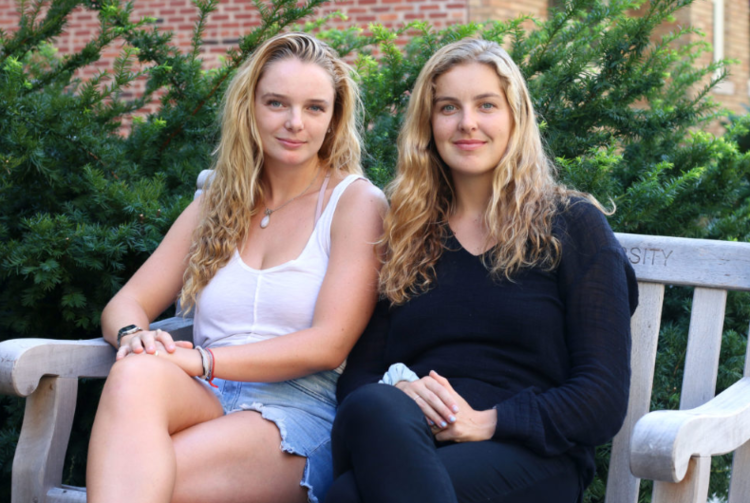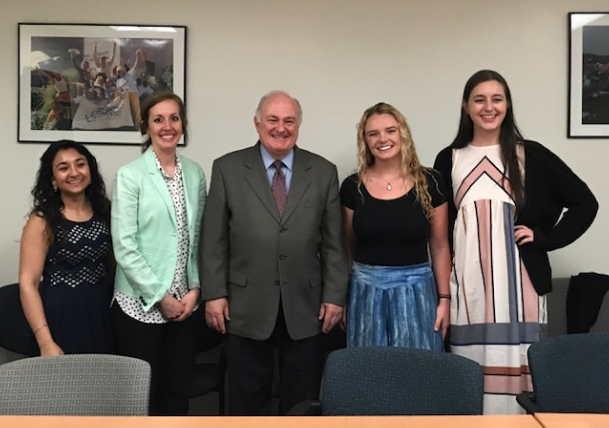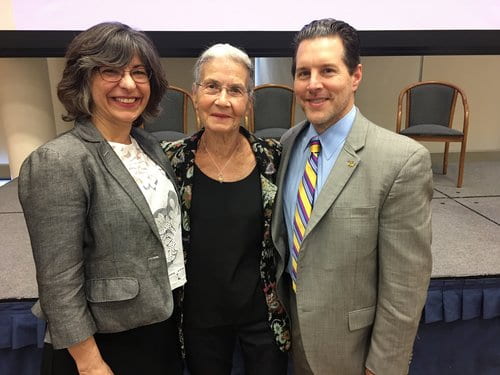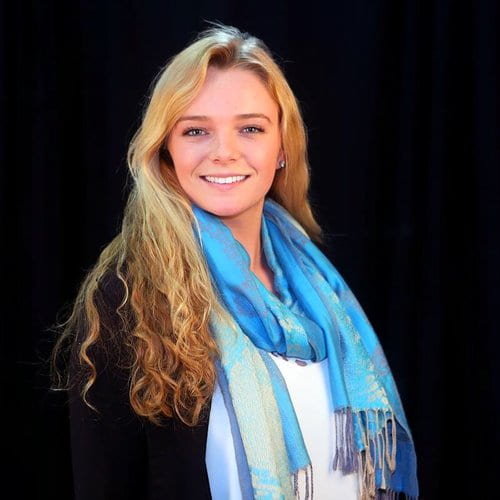Bianca Trinidad is a Community Engaged Scholar with the Nashman Center. She sat down to talk with Gillian Joseph one of two winners of the 2018-2019 Knapp Fellowship Award.
Bianca: Tell me about your project.
Gillian: So, I named my project, Find Our Women, but the purpose of it is to provide an answer to the unanswered - to give part of a solution to the missing and murdered indigenous women crisis that’s going on in the U.S. and also in Canada, but the U.S. has no public inquiry into it, whereas Canada does. So, there’s really been nothing done formally to help indigenous women that have been going missing and being killed in the U.S.
My project revolves around creating a website and also a mobile application for phones, because a huge problem is how information flows between police networks and reservations, because a lot of times they’re really rural and isolated.
My project is trying to make it easier for women and the families of women to report when they’re missing or something is wrong. And to have a formal database. You see, indigenous women don’t have their own database and they’re not always registered under a federal missing persons database. So, that’s really important to actually have data on, because there is no true data on indigenous women going missing. A lot of the data is collected from community members that are like “My aunt is still missing” or “My sister is still missing”. So, that’s the biggest part of it.
The website will have all the resources needed on it and a lot of facts and statistics. There’s no one place that you can go to to get facts and stats, and so, I’m hoping that my website would make it easier for indigenous women to have resources they need, such as hotline numbers or other websites that will be useful to them. Any information that needs to go to them will be on the website and also, just for the general public to have a place to go, because I feel like it’s hard to get people to pay attention, and it’s really hard if you tell them about it, and they have to Google search for about half an hour in order to find anything. So hopefully, it will make it easier to raise awareness.
The last part of my project is getting firsthand accounts and stories of families of missing women and survivors that have gone missing or have had experience with domestic violence and for them to be able to share their stories about it. This collection of stories will be posted on the website, and accessible to the public. I feel like a lot of times, people care more when they hear a firsthand account. I feel like it’s hard to understand what is actually going on. A lot of people don’t know anything about it - which is expected. It’s not really publicized. So getting traction behind it and showing indigenous voices, instead of talking over them.
Bianca: So, what inspired you to take on this kind of project?
Gillian: I’m actually part Dakota. My dad is Dakota, my mom is white. So, my dad is from South Dakota, and I actually spent last summer living on the Cheyenne Reservation in South Dakota, and culturally, it is really important to protect women, because women are considered sacred in a lot of Dakota tribes and also in general Native culture.
I’ve heard stories from my dad, and it’s been going on since my dad was a kid and before then. And my friends; and just like knowing that women I’m related to or are in the same tribe or tribal nation as me are going missing is - it’s a lot to think about, because it’s not always in your mind. But when you have that attachment to it, it is.
So I would talk to my dad about it a lot and to other people. I have a really awesome mentor. My faculty advisor here; she is also a Native woman. So talking to her about it and to other Native women really helped me decide that it wasn’t enough for me to just talk about it. But instead, I need to actually offer what I thought could maybe help. We’ll see if it does! I think it will!
Bianca: I definitely think it will. Okay, so how do you hope this fellowship will affect the community you are doing research with?
Gillian: So, I truly hope that it will give at least the native communities, well I would be focusing more on the Dakotas, just because that’s where I have a relational tie to. But I’m hoping that it will really give indigenous women a voice in this nation, because a lot of times I see people talking about MMIW (Missing and Murdered Indigenous Women), but never mention actual women, and so, they just turn into an epidemic and not people. So, it dehumanizes them in a way. And so, that would be really effective, and also having this data from the database collected and giving indigenous women a way to have to report their family and their friends, and just having that power, which is a basic human right. Having that will hopefully: a) create awareness for the community and have people take it more seriously and b) eventually get the government to help officially recognize that.
Bianca: So what kinds of research methods will your research use and how do these methods bring the community into your work?
Gillian: I think a lot of times people think about research in a very different way than Native culture and communities do. So, when you go to an actual tribe or community in a reservation, and hand out surveys, they would be like “what are you talking about?”. It wouldn’t translate very well. But a really big value with research and doing research, in a way that Native people do, is a lot of discussion. I’ll be going to South Dakota and will talk to tribal elders, members and of course, women to try to understand what they think they need and what they want to see out of it, because that’s the best way to do research: to have those kinds of big round table discussions. For quantitative research, the database will definitely be a big part of that, and it will be directly from indigenous communities. I’ll be able to look at that data and see what’s happening. A lot of times, people report to police officers or they’re reported online, like people post about it on Facebook groups and stuff. So, that data will be collected from those sites and will be put into one place, so that you can actually find it.
Bianca: Why do you think it is important for student researchers or researchers in general to incorporate members of the community into research?
Gillian: So, sometimes it is the difference between helping someone and helping provide the resources to help someone. So, this idea of not talking over people and not implementing something onto the community, but with the community. Especially with Native communities, there’s a long history of people who try to help in a way that is more along the lines of white saviorship than actual help. So, I think when you integrate people from a community into your project, you’re actually helping the community more, because you’re putting their voices first; you’re understanding more about what they actually need and not what you think they need.
Bianca: I agree. So next question, do you have a favorite researcher, community scholar, or activist who inspires you?
Gillian: Hmm, that’s a really good question. I never really thought about that. I don’t know. I’m always really impressed by other Native American women; like regardless of who they are and what they’re doing. Whenever I see them being really active, whether it’s helping their community in general or the broader Native community or general public, it’s always so awesome to see that. You know, it’s inspiring. A lot of times, I think I never see Native women in a public space, so that’s really cool; like Winona Laduke, she’s a Native activist. In general, native women inspire me.
Bianca: You could’ve chosen several different ways to do your research, so why involve the community?
Gillian: Native values and that cultural understanding of putting their voices first are really important to me. I don’t want to talk over anyone, because it should be coming from the survivors and their families, and from the women’s ideas and voices.
Bianca: So, do you anticipate working with any community partners in this research?
Gillian: I haven’t formally signed on with any community partners. In the future, possibly. There’s not a huge amount of Native American Women-specific organizations. I can only think of one: The National Indigenous Women's Resource Center, and I’ve talked to them a little. We haven’t formally agreed to anything. I’m sure that there will be other organizations that will be able to help me, or at least help me with resources and guidance. The community is really awesome. I feel like if you ask a question, people will be able to answer it.
Bianca: Okay, so last but not least, is there anything you’d like to say to the Former GW President and Mrs. Knapp for funding the fellowship?
Gillian: Thank you so much! When I heard the news that I won the fellowship, I called my dad and we were both crying, because there’s just nothing that addresses what indigenous women go through and how important Native American women are. So yeah, that’s kind of cool to know that this fellowship is funding something that should’ve been funded long ago, and I’m glad that I can be that person to help get it through and who helped get it funded. So, thank you.
Bianca: Congratulations once again! I think that what you are doing is incredible and super inspiring.















